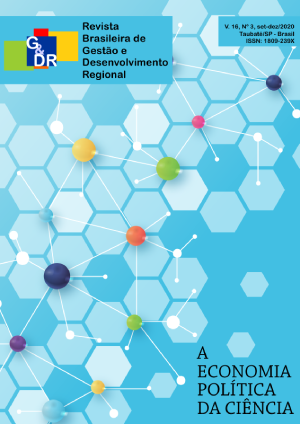ECOSSOCIOECONOMIAS: ANÁLISE DE EXPERIÊNCIAS AO OESTE DOS ESTADOS UNIDOS DA AMÉRICA
Palabras clave:
Mudanças climáticas. Desenvolvimento. Arranjos Institucionais. Arranjos Socioprodutivos.Resumen
O objetivo deste artigo é realizar uma análise comparativa de dez experiências com dimensões ecossocioeconômicas no território Oeste dos Estados Unidos da América. A metodologia se estrutura na revisão bibliográfica e documental, estudo exploratório e pesquisa de campo. As experiências possuem características híbridas em relação às modalidades ecossocioeconômicas, e classificam-se como de responsabilidade socioambiental corporativa, cooperativismo, gestão pública municipal, gestão de unidades de conservação, movimento sócio político, città slow e ecovilagges. Os resultados sugerem que nas experiências norte americanas observadas existem uma correlação entre ação instrumental e substantiva, no entanto não reduzida à esfera da economia, quando esta apresenta concepção meramente mercantil, desconectada das outras dimensões da esfera da vida, bem viver e sustentabilidade. Conclui-se que a instrumentalidade da ação humana ainda persiste e se torna necessária na ocasião que se compreende a escala intergeracional. Ainda que as experiências sejam comparativas, constituem-se em territórios próprios, o que sugere que cada um possui gênese que lhe distingue.Publicado
2020-10-25
Cómo citar
Sampaio, C. C., Grimm, I. J., Alcântara, L. C. S., & Mantovaneli Junior, O. (2020). ECOSSOCIOECONOMIAS: ANÁLISE DE EXPERIÊNCIAS AO OESTE DOS ESTADOS UNIDOS DA AMÉRICA. RBGDR, 16(3). Recuperado a partir de https://www.rbgdr.net/revista/index.php/rbgdr/article/view/5888
Número
Sección
Artigos
Licencia
Os autores que tiverem seus trabalhos aceitos e publicados na Revista Brasileira de Gestão e Desenvolvimento Regional estarão sujeitos a política de direitos autorais CC https://creativecommons.org/licenses/by/4.0/.
Em caso de aceite do artigo para publicação, os direitos autorais são automaticamente cedidos para a Revista Brasileira de Gestão e Desenvolvimento Regional.

















